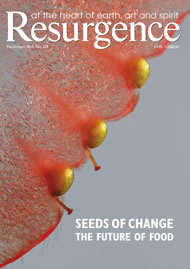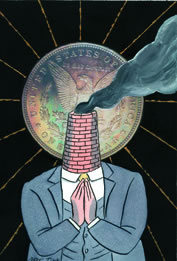The ancient Roman Catholic doctrine of indulgences has been born again in the 21st century. The once popular practice allowed rich parishioners to purchase remission for their sins by making contributions to the church’s minions. The Council of Trent tried to outlaw the practice in 1562. In June 2009, the US Congress resurrected the concept of conscience-clearing as a key portion of the American Clean Energy and Security Act.
Instead of requiring polluters to implement costly emission reductions of climate-warming gases, “the art of political compromise” produced a ‘market-based solution’ that allows industrial sinners to keep on spewing as long as they acquire the pollution indulgences – beg pardon, pollution credits – from cleaner, greener operators.
Congress’s new cap-and-trade scam would put the Church’s indulgence scheme to shame. President Obama originally proposed auctioning “permits to pollute” to fund a Green Tech revolution. Congress, in its wisdom, decided to give away 85% of these credits to the biggest polluters – for free.
The problem with cap-and-trade schemes is that they don’t work. Instead of paying for a solution, purchasers are just buying time. In the 1990s, the Clean Air Act introduced a cap-and-trade plan to control the lake-killing acid rain caused by Midwest power plants. Utility owners reaped huge profits but the lakes remained acidified.
In its first three years, the European Union Emissions Trading Scheme failed to reduce emissions – but it did generate soaring electricity bills and a £1 billion windfall for British utilities. Why? Because the widespread availability of free pollution credits left industries no incentive to reduce emissions. Cap-and-trade plans prompt polluters to rejoice and toss their caps in the air. Why? Because, with a fistful of pollution credits, they can toss their ‘caps’ to the winds.
What would it look like if we applied the medieval logic that underlies the granting of ‘pollution indulgences’ to other aspects of human behaviour? A few adaptations of Emissions Trading come to mind:
Admissions Trading: We know politicians lie. With Admissions Trading, politicians would no longer have to fear admitting their fibs. They could continue lying to the public as long as they purchased Truth Credits from Buddhist monks and young children.
Omissions Trading: Did you forget to recycle? Did you forget that vow to eat organic? With Omissions Trading, forgetful souls could ‘offset’ their bad habits by purchasing performance credits from the conscientious.
Thanks to the genius of market-based solutions, the morbidly obese could continue to overeat – just so long as they remembered to purchase Calorie Credits from health-conscious neighbours and malnourished Third World villagers. You want that extra helping of dessert? Just pay someone to forgo dinner.
Remissions Trading: People with terminal cancer could buy Recovery Credits from cancer survivors and individuals who are cancer-free. Of course, remissions trading wouldn’t cure the cancer and the buyer would still die from the disease. In other words, it would be just as effective as cap-and-trade’s pollution credits.
Possessions Trading: The filthy rich could buy Poverty Credits from the very poor. This is one trading plan that could significantly improve the overall health of our planet and its people, but when it comes to redistributing wealth, this is one idea that the well-to-do just don’t seem prepared to indulge.
These ideas for guilt-swapping are meant to be in jest but, unfortunately, the joke’s on us. Faced with a climate calamity, there are better ways than cap-and-trade to set the world right.
The implosion of the global economy could open the door to new economic models based on community and sustainability. In his June 2009 encyclical, Caritas in Veritate (Charity in Truth), Pope Benedict XVI – the head of the same church that gave birth to the indulgences – attributed global recession to “the pursuit of financial goals without moral ends”. The Pope criticised the faltering market economy as “an engine of wealth creation” that “trample(s) on personal and social freedom” and creates a “scandal of glaring inequalities”.
What the world needs, the Pope suggested, is a new economic model that would guarantee “the protection of the environment … timely disarmament, food security and peace”.
The Catholic Church, at least, has come to the conclusion that venality just doesn’t work. Even Nobel Prize-winning economist Joseph Stiglitz has prescribed “the restructuring of our global economic and financial system in ways that ensure that the fruits of prosperity are more widely shared”. Clearly, the time has come to put an end to the global economy’s Sins of Emission.
This is an edited version of an article originally published in the Autumn 2009 edition of Earth Island Journal: www.earthisland.org







